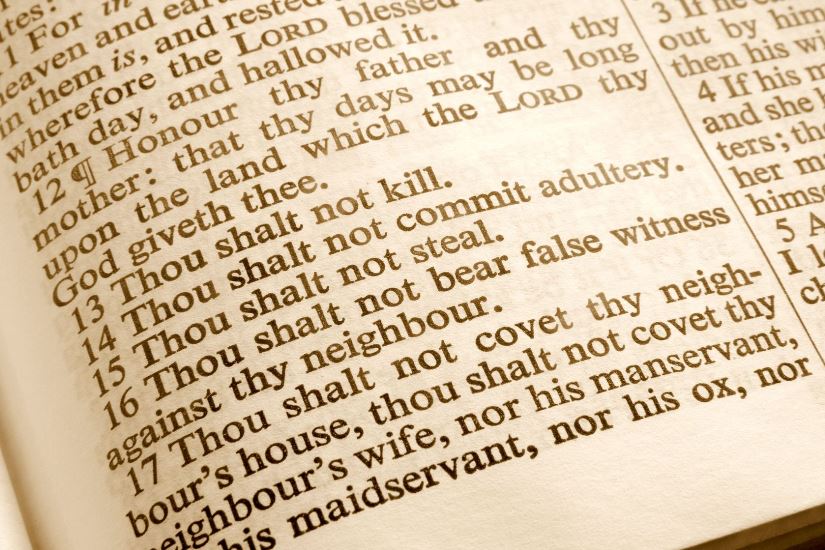
In our original creation, God gave our first parents certain responsibilities in the new world. As the bearer of the imago dei, Adam was given the tasks of exercising dominion in the world, reproducing, and organizing the fruitfulness of the world (Genesis 1:26-30). In these ways, Adam was to be God’s viceroy, exercising a role analogous to that of God, but subordinate to Him. However, Adam rebelled against God, and marred the image, such that his descendants bore, not the image of God, but rather the image of Adam (5:3). As a result, Adam was cursed with death, and all his labors were cursed with futility, and His wife was cursed in all her familial relations (3:16-19). Yet, the viceroyal calling of Adam was not revoked, as we see in its renewal to Noah after the Flood: “Then God blessed Noah and his sons, and said to them, ‘Be fruitful and multiply and fill the earth. Every beast of the earth and every bird of the sky and all that moves on the earth and all the fish of the sea will fear you and be terrified of you. Every moving thing that lives will be food for you. I give you everything, just as I gave you the green plant” (Genesis 9:1-3).
We continue to see hints of this dominion covenant as the covenantal history continues. For example, we see God’s promise to Abraham that all the nations will be blessed through him (e. g., Gen. 12:2-3). Part of this plan is seen in the mediatorial role that God gives His people toward the rest of the world, such as Abraham’s intercession in 18:22-33, and Jacob’s altar work in 35:1-15. The godly seed are called to rulership, such as in 27:29, 41:38-49, and 49:10: “The scepter shall not depart from judah, nor a lawgiver from between his feet, until Shiloh comes; and to him will be the obedience of the people.”
Under the Old Covenant, this calling reached its pinnacle in the royal priesthood: “You will be to Me a kingdom of priests and a holy nation” (Exodus 16:6). Yet, this calling was not limited to israel or to the Mosaic economy, as the Apostle Peter made clear: “You are a chosen race, a royal priesthood, a holy nation, a people for God’s own possession, so that you may declare the goodness of Him who has called you out of darkness into His marvelous light” (I Peter 2:9). Peter expands the calling explaining it as a responsibility to represent Him who bought us to the unbelieving rest of the world. He says that, as priests, we are to offer up spiritual sacrifices (verse 5). What are those sacrifices? Our bodies (Romans 12:1), our material possessions (Philippians 4:18), our praises (Hebrews 13:15), and our prayers (James 5:16). Thus, everything in our day to day lives is subservient to our calling as priests. Our bodies are to be given for the work of God. Our possessions are to be given for the work of God. Our praises are to be given in our work (as Piper says, “Missions is not the ultimate goal of the church. Worship is. Missions exists because worship doesn’t. Worship is ultimate, not missions, because God is ultimate, not man. When this age is over and the countless millions of the redeemed fall on their faces before the throne of God, missions will be no more. It is a temporary necessity. But worship abides forever,” p. 35). And our prayers are to be offered for each other and for the recipients of our message.
As God’s nation of priests, Israel was explicitly instructed to portray Him to the nations. There was both a passive sense of this mission, such as in Deuteronomy 4:6: “Therefore, keep and do them [i. e., the Law], for this is your wisdom and your understanding in the sight of the nations which shall hear all these statutes, and say, ‘Surely this great nation is a wise and understanding people.’” Among other things, the Law was intended by God (preceptually speaking, not in the sense of a failed decree) to make His people a shining example to the pagan nations around them. This theme, too, was repeated in the New Testament: “You are the light of the world. A city that is set on a hill cannot be hidden. Neither do men light a candle and put it under a basket, but on a candlestick, and it gives light to all who are in the house. Let your light so shine before men that they may see your good works and glorify your Father who is in heaven” (Matthew 5:14-16).
It is this shining example that leads to the fulfillment of the promises of the Father to the Son: “All the ends of the world will remember and turn to the LORD, and all the nations will worship before You” (PSalm 22:27). Notice especially here the fulfillment of Piper’s thesis of missions leading to worship. Also, “Thus says the LORD of hosts, in those days ten men from every language of the nations will take hold of the garment of a Jew, saying, ‘Let us go with you, for we have heard that God is with you’” (Zechariah 8:23). Thus, we see that a missionary concern didn’t start with the New Testament.
The missionary calling of Israel was not merely passive, however. God’s calling to them was a call to action: “Let all the nations be gathered together, and let the people be assembled… [For] you are My witnesses, says the LORD, and my servant whom i have chosen, that you may know and believe Me, that I am He… I, even I, am the LORD, and besides Me there is no Savior… therefore, you are My witnesses, that I am God” (Isaiah 43:9-12). God reveals Himself to israel, with the explicit intent that that nation would then be His witnesses, His missionaries, to the rest of the world. While Israel fell far short of her calling, her failure wasn’t absolute. We have the story of Ruth, in which a Moabitess comes to believe in the true God (1:!6), in spite of the restriction in Deuteronomy 23:3, and becomes an ancestress both of King David and of Jesus Christ.
Another principle in the Old Testament is the creation of the new heavens and new earth: “I create a new new heavens and a new earth; the former things shall not be remembered or come to mind. But be glad and rejoice forever in that which I create, for I create Jerusalem for rejoicing and her people for joy. I will rejoice in jerusalem and be glad in my people; and the voice of weeping shall no longer be heard in her, nor the voice of crying” (Isaiah 6517-19). In this new heavens and new earth, “All flesh shall come to worship before Me, says the LORD” (66:23). Peter adds that, “according to his promise, we are waiting for new heavens and a new earth, in which righteousness dwells” (II Peter 3:13). Contrary to the claims of the premillennialists, this cannot be a reference to the eternal state, because there will still be death and a need to eat (Is. 65:20). Rather, this is a description of the New Jerusalem, the church in its prosperity (ibid., verses 18-19, Heb. 12:220, where righteousness shall dominate (II Peter 3:13), though some sinners remain (Is. 65:20). This is a description of the result of the mission of God, a prosperous church in a world, not where the curse has been completely eliminated, but in which the Gospel has created a world in which the nations are largely converted and living lives commensurate to their spiritual state: “There shall no longer be an infant who lives only a few days, nor an old man who has not filled out his days. For the child shall die a hundred years old, but the sinner being a hundred years old shall be accursed” (ibid.).
It is against this Old Testament background that we see the significance of the missionary heart of Jesus: “Jesus went throughout all the cities and villages, teaching in their synagogues, preaching the gospel of the kingdom… But when he saw the crowds, he was moved with compassion for them, because they fainted and were scattered, like sheep without a shepherd. Then He said to His disciples, ‘the harvest truly is plentiful, but the laborers are few. Therefore, pray to the Lord of the harvest, that He will send out laborers into His harvest” (Matthew 9:35-38). This reveals three things about the divine mission: first, it is based on the compassion of Jesus; second, it is the responsibility that he gives to His disciples; and third, a missionary goes out only by the calling and sending of God (compare Isaiah 6:9). This is an astonishing passage, because we know that the purpose of Christ was to redeem the elect (john 3:16, Ephesians 5:25, etc.). However, this passage shows us that, separate from the issue of election, He was not blind to the rest of humanity, but was, rather, filled with sorrow by their sin, spiritual blindness, disease, futility, and even their stubbornness. Consider His statement in Matthew 23:37: “O Jerusalem, Jerusalem, you who kill the prophets and stone those who are sent to you, how often I would have gathered your children as a hen gathers her chicks under her wings, but you would not!” These same people that he condemned to judgment for the murder of the prophets (see the previous verse and the Parable of the tenants, Matthew 21:33-44), brought Him to tears of sorrow over their hardheartedness.
Out of this compassion, Jesus passed His missionary heart on to His disciples in the Great Commission. So important is this to God that the Holy Spirit inspired it over and over, as the Apostles wrote the New Testament. Of course, the best-known version is that of Matthew 28:18-20: “Jesus came and spoke to them, saying, ‘All authority has been given to Me in heaven and earth. Go, therefore, and make disciples of all nations, baptizing them in the name of the Father and of the Son and of the Holy Spirit, teaching them to observe all things I have commanded you. And remember, I am with you always, even to the end of the age.’” These three sentences teach us two main things about the call of Jesus to evangelize. First, our mission is not a power in ourselves, but is, rather, dependent on His mediatorial kingship. The mission of the Christian is to serve as the frontline combatant in Christ’s conquest of the nations (Revelation 11:15). He has already gained all of the authority necessary to apply His claims to the nations: “I have installed My king on Zion, My holy hill. Ask of Me, and I will give You the nations for Your inheritance, and the ends of the earth for Your possession” (Psalm 2:6, 8). The Father promised Him the nations, and the Great Commission is His claim to that which was promised. So important is this authority to our mission that He mentions it twice, as the basis of our mission, and as the unfailing encouragement to continue the battle, even in the face of apparent failures. Second, the Great Commission indicates what a mission is, the things that our divine and royal general has given us to do. Not just to proclaim the Gospel, and not just to win a convert here and another there, but, through His effectual authority, to disciple the nations, which means to convert them, to baptize them, and to train them in obedience to God’s word. This is not evangelism as extraction from the world, but as overcoming the world!
In Mark 16:15, we have the words of Jesus explicitly to the Eleven: “Go into all the world, and preach the Gospel to every creature. He who believes and is baptized will be saved. But he who does not believe will be condemned.” This version of the Great Commission appears to be aimed specifically at the Apostles, not disciples in general, both because of the introduction to it (verse 14), and also because of the miraculous consequences. The extraordinary signs were for the verification of the ministry of the Apostles ( Mark 16:20, Acts 14:3, II Corinthians 12:12, Hebrews 2:3-4). However, it does indicate to all Christians the importance of profligate proclamation of the Gospel.
Finally, in His last earthly sermon, Jesus announced to the gathered, but frightened, Church, “You
shall receive power when the Holy Spirit comes upon you. And you shall be My witnesses in Jerusalem, and in Judea and Samaria, and to the ends of the earth” (Acts 1:8). We see some of the same themes from Matthew, but made more explicit. There, the Lord had promised the power of His authority in the mission of the Church. Here He tells them that that authority would work by the presence of the Holy Spirit. There, He had sent them to all nations. Here He assigns them a concentric geographical series to achieve that assignment: Start in jerusalem, your current environs, then expand to the immediate surrounding area of Judea and Samaria, and then on to the rest of the nations of the world. We quickly see the fulfillment of this battle plan, as the persecution that broke out after the stoning of Stephen first drove disciples into Samaria (Acts 8:5), then to Gentiles in general (ibid., 10:45), and then to more-distant regions (ibid., 11:19). Paul took it to the final stage in deliberately seeking out unreached regions for his mission: “I have strived to preach the Gospel, [but] not where Christ was named, so that I should not build on another man’s foundation” (Romans 15:20).












